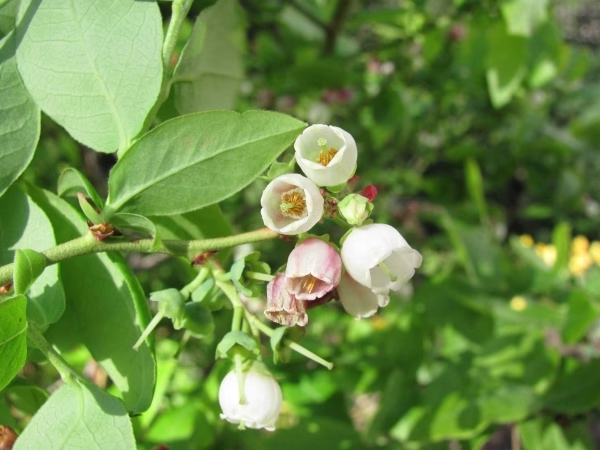
Highbush Blueberry
Botanical Name
:
Vaccinium corymbosum
Plant Type
:
Deciduous shrub
Seasons
:
Plant in early spring or early summer; blooms in mid to late spring
Sun Level
:
Full sun to partial shade; thrives in at least 6 hours of daily sunlight
Ideal Soil Temperature for Planting
:
65 to 75°F (18 to 24°C)
Soil Type
:
Acidic, well-drained soil with high organic matter
Hardiness Zones
:
3–8 (USDA)
Germination
:
1–3 months
P.H. Level
:
4.0–5.5
Water/Irrigation
:
Keep soil consistently moist but not waterlogged. Mulch to retain moisture
Fertilization
:
Use a balanced fertilizer (e.g., 10-10-10) in early spring
Habit
:
Upright, multi-stemmed shrub forming a dense thicket
Propagation
:
Seeds and cuttings
Final Plant Height
:
6–12 ft
Spread
:
6–12 ft
Flowers
:
Small, bell-shaped flowers that are typically white or pale pink; bloom in clusters
Attracts
:
Bees, butterflies, and other pollinators
Uses
:
Ornamental, edible garden, pollinator garden, rain garden
Companions
:
Azaleas, rhododendrons, hollies, camellias
Pruning
:
Prune in late winter to remove dead wood and maintain shape. Remove flowers in the first two years to promote root and shoot growth
Toxicity
:
Non-toxic to humans and pets
Pests
:
Spotted wing drosophila, birds (netting recommended during fruiting season)
Diseases
:
Stem blight, root rot, anthracnose, cane cankers, mildew, botrytis, mummy berry
Additional Info
:
Highbush blueberry is one of the most common commercially grown blueberries in North America. It was cultivated by Native American tribes for food and medicinal purposes
Botanical Name
:
Vaccinium corymbosum
Plant Type
:
Deciduous shrub
Seasons
:
Plant in early spring or early summer; blooms in mid to late spring
Sun Level
:
Full sun to partial shade; thrives in at least 6 hours of daily sunlight
Ideal Soil Temperature for Planting
:
65 to 75°F (18 to 24°C)
Soil Type
:
Acidic, well-drained soil with high organic matter
Hardiness Zones
:
3–8 (USDA)
Germination
:
1–3 months
P.H. Level
:
4.0–5.5
Water/Irrigation
:
Keep soil consistently moist but not waterlogged. Mulch to retain moisture
Fertilization
:
Use a balanced fertilizer (e.g., 10-10-10) in early spring
Habit
:
Upright, multi-stemmed shrub forming a dense thicket
Propagation
:
Seeds and cuttings
Final Plant Height
:
6–12 ft
Spread
:
6–12 ft
Flowers
:
Small, bell-shaped flowers that are typically white or pale pink; bloom in clusters
Attracts
:
Bees, butterflies, and other pollinators
Uses
:
Ornamental, edible garden, pollinator garden, rain garden
Companions
:
Azaleas, rhododendrons, hollies, camellias
Pruning
:
Prune in late winter to remove dead wood and maintain shape. Remove flowers in the first two years to promote root and shoot growth
Toxicity
:
Non-toxic to humans and pets
Pests
:
Spotted wing drosophila, birds (netting recommended during fruiting season)
Diseases
:
Stem blight, root rot, anthracnose, cane cankers, mildew, botrytis, mummy berry
Additional Info
:
Highbush blueberry is one of the most common commercially grown blueberries in North America. It was cultivated by Native American tribes for food and medicinal purposes
Written by Nondiah Khalayi – https://www.linkedin.com/in/nondiah-khalayi/

